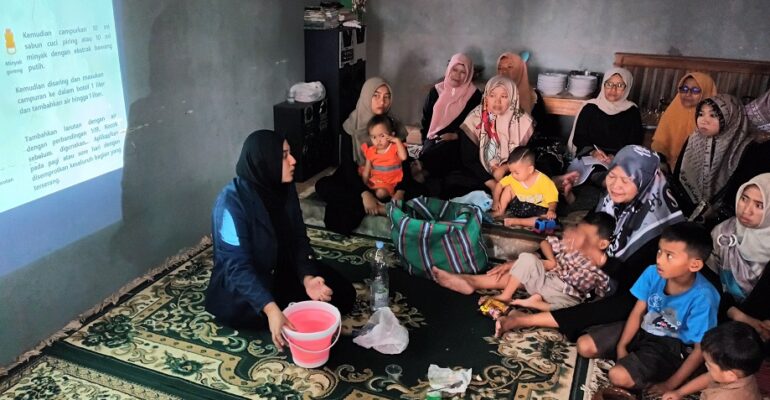IPB University’s Students of the Innovation KKN-T program introduced Natural Pesticides, Using Simple Kitchen Ingredients

IPB University’s students who are currently participating in the Innovation Real-Thematic Work Lecture (KKN-T) program conducted a socialization and demonstration of natural pesticides in the village of Buniwah, Bojong District, Tegal Regency, Central Java. This socialization was directly presented to two community groups, namely the Rosella Community Group and the Wijaya Kusuma Community Group.
“Natural pesticides are organic-based pesticides derived from plants. They generally use ingredients that are easily found in the surrounding environment. Being organic, natural pesticides tend to not pollute the environment and are safe for humans and plants,” said Khansa Luvena Hendra, one of the IPB University students, while explaining to the residents.
Pests and diseases are important issues in agriculture. Typically, their control involves the use of chemical pesticides. However, these tend to be more expensive and can leave residues on agricultural products. “Therefore, the use of natural pesticides can be an alternative that is cheaper and environmentally friendly,” Khansa said.
During the occasion, Khansa discussed natural pesticides, how they work, and introduced the pests and plant diseases that can be controlled.
According to her, making natural pesticides is relatively easy. The ingredients are readily available and do not require advanced technology. The demonstration of making natural pesticides used garlic as the main ingredient.
Diffa Ulinnuha, a representative of the Innovative KKN-T program from IPB University, added that this activity could become a future work program for the community groups. It’s not just about planting activities; the community also needs to start taking care of plants, one of which is by utilizing various household ingredients to create natural pesticides.
“Our hope is that this activity can be a positive initial step for the village women’s groups,” she continued.
“Information about natural pesticides is easy to understand and beneficial. I myself am interested in trying to make natural pesticides due to their ingredients sourced from the environment and the simplicity of the process,” said Hilmah, one of the residents who participated in this activity. (*/Rz) (IAAS/DSR)



